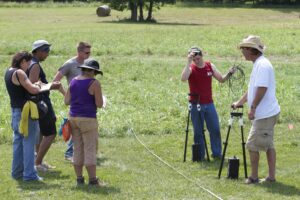
Students on archaeological dig
As a master’s student, you will have the opportunity to apply anthropological theories and methods to solve real-world problems. Your core courses will be intertwined with mentored research projects and internships with community stakeholders.
Take advantage of our long-standing departmental strengths in public archaeology, urban anthropology, international development, globalization, medical anthropology and museum studies. You will be well-trained in a broad range of anthropological approaches, but you may choose to follow a targeted curriculum, focusing on a particular aspect of the discipline.
 “Earning my degree in Applied Anthropology has been the most rewarding educational experience I’ve had thus far. This program allowed me to explore new interests in bioarchaeology and directly contributed to my current position as a staff archaeologist for an environmental firm. This program allowed me to discover new fields of study and provided me with the tools I needed to excel in the professional world. I currently work as a staff archaeologist for Metric Environmental and contribute to archaeological research, fieldwork, and the composition of reports. I could not have become the archaeologist I am today without the guidance and instruction of the individuals working in the Department of Anthropology at IUPUI. The professional relationships I’ve made here have been incredibly useful as I seek to create the future I’ve always envisioned for myself. ”
“Earning my degree in Applied Anthropology has been the most rewarding educational experience I’ve had thus far. This program allowed me to explore new interests in bioarchaeology and directly contributed to my current position as a staff archaeologist for an environmental firm. This program allowed me to discover new fields of study and provided me with the tools I needed to excel in the professional world. I currently work as a staff archaeologist for Metric Environmental and contribute to archaeological research, fieldwork, and the composition of reports. I could not have become the archaeologist I am today without the guidance and instruction of the individuals working in the Department of Anthropology at IUPUI. The professional relationships I’ve made here have been incredibly useful as I seek to create the future I’ve always envisioned for myself. ”
– Megan Copenhaver, Dec. ’21 MA in Applied Anthropology
The M.A. in Applied Anthropology requires students to complete 36 credit hours including:
If you choose the thesis option, you will develop and write a thesis supervised by a three-member committee of full-time faculty, enrolling in ANTH-A 699: Master’s Project in Applied Anthropology for six credit hours over one or two semesters. In most cases, the thesis will explore a research question related to some aspect of the urban setting of greater Indianapolis and Central Indiana or archaeology and heritage management in the Midwest. You will demonstrate your ability to work independently on that topic and to apply both theoretical insight and methodological skills to a substantive issue. You will be required to successfully defend your thesis before a committee.

Students in field work
If you choose the internship option, you will be placed with a non-governmental organization, a city or county agency, a museum, a cultural resource management organization, or a community-based organization. With the sponsoring organization, you will complete an approved project.
If you choose the research option, you may write a research paper that is assessed to be publishable in a referred journal. Alternatively, if your primary interest is focused on museums or in cultural resource management, you may develop and produce a public exhibit in Indianapolis or Central Indiana. Lastly, you may produce a report that contributed significantly to a policy issue in Indianapolis or Central Indiana. You may submit an article for publication to a variety of peer-reviewed journals.
See our degree requirements.
Check our graduate courses.
Contact the graduate program director.